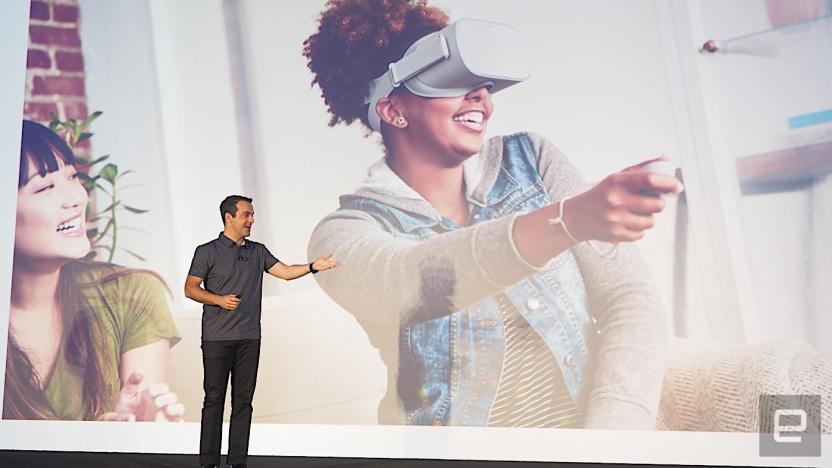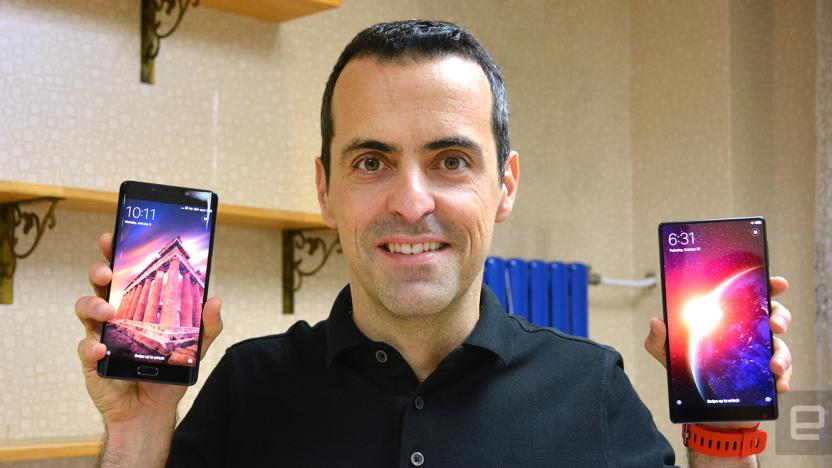hugobarra
Latest

Facebook's Hugo Barra says standalone headsets are key to social VR
Even though Oculus didn't have an official presence at CES this year, its leader, Hugo Barra, made a surprise appearance at Qualcomm's press conference to make an important announcement: Xiaomi would be its global hardware partner for Oculus Go, its first standalone VR headset. What's more, Xiaomi would also be making a special variant of the Go, the Mi VR Standalone, especially for China. In an interview with Barra following the press conference, he explained the reason for the push in standalone headsets: social VR.

Hugo Barra's next job: Head of Oculus VR
Mark Zuckerberg just revealed the next landing spot for former Google and Xiaomi executive Hugo Barra: Facebook. As Barra revealed a couple of days ago, he's coming back to Silicon Valley and will "lead all of our virtual reality efforts, including our Oculus team." This fills the hole left when former Oculus CEO Brendan Iribe stepped down to focus on the company's PC efforts in December, as Barra becomes the VP of VR at Facebook. The announcement came along with a pic of Zuckerberg and Barra hanging out virtually, since the new VR exec is still in China. In a comment on the post, Barra said "It's been a dream of mine to work in virtual reality even back when AR/VR were just figments of science fiction; now we're taking selfies in virtual worlds," and stated his plan is to take the technology mainstream.

Hugo Barra leaves Xiaomi and will return to Silicon Valley
VP Hugo Barra announced on Facebook that he'll be leaving Xiaomi and returning to Silicon Valley. Barra, who became a popular figure in the company both at home in Beijing and abroad, was a star at Google's Android division prior to his tenure at Xiaomi. He called his time in Beijing "the greatest and most challenging adventure of my life," and said he feels he's leaving Xiaomi in a "good place on its global expansion path." At the same time, he said that "living in such a singular environment has taken a huge toll on my life and started affecting my health."

Xiaomi aims to be more than king of the budget smartphones
The day after the Mi Note 2 and Mi MIX launch last week, the flagship Mi Home store next to Xiaomi's headquarters was packed with visitors. Nope, they weren't there to spend their yuan, but simply to wait for their turn to play with the new phones. But the real star was clearly the Mi MIX "concept phone." People were drawn to its near-bezel-less display and fancy ceramic body. Despite this being Xiaomi's most expensive smartphone ever, I heard many visitors ask if they could buy one immediately, only to be let down when told they have to wait until Nov. 4th. Xiaomi must be doing something right

Outside China, Xiaomi seeks another home on US networks
October 9th marked Hugo Barra's third year at Xiaomi, and as its Global Vice President, he watched the company evolve from a China-centric smartphone e-tailer to an IoT ecosystem with a growing international footprint. Xiaomi's recently entered Russia, Mexico and the Middle East, with Poland, Vietnam, Thailand plus a couple other Latin American markets next on the docket. But the long list is still missing one key region: the US. While the ex-Googler continues to stay mum on a launch date, he did reveal to Engadget that his team has already started testing phones in America. Such commitment is an important milestone ahead of the notoriously tough US carrier lab tests.

A tour of Xiaomi's headquarters and Mi Home store
Xiaomi was quite a different company when I first visited its headquarters back in August 2011: It only occupied three floors in a small building, the cubicles were tight, security was loose (I literally just walked in almost every time) and people were working crazy long hours almost seven days a week. That was right after the company launched its first device, the original Xiaomi Phone, which set a new bar for affordable flagship smartphones in China. Fast forward to today and you'll find yourself looking at a global brand that has gone well beyond mobile and online, while its latest smartphones -- namely the Mi Note 2 and Mi MIX -- are looking better than ever. To see for yourself, check out our photo tour around Xiaomi's latest headquarters and a strangely familiar-looking Mi Home store nearby.

Xiaomi will launch its first drone on May 25th
Chinese consumer electronics maker Xiaomi looks set to add a drone to its range of products next week. The company has already begun teasing a May 25th launch event on its official forum, posting what appears to be a first look its new quadcopter and asking users to guess what the product will be called. Given the forum post has the title "Mi Drone," Xiaomi may have already given the game away.

Hugo Barra on why Xiaomi is against microSD cards in phones
If you were to compare iOS and Android, the latter's storage expansion option via microSD -- up to a whopping 200GB these days -- is often regarded as an advantage, though not all devices come with such offer. For instance, while HTC and LG have made the microSD slot a standard feature on their recent flagship devices, Samsung oddly decided to remove it from its Galaxy S6 series (ironically, the company has just announced new microSD cards). Xiaomi, on the other hand, seems to be on the fence: its flagship line has long ditched the microSD slot after its first-gen device, yet its affordable Redmi line uses said feature as a selling point. It's as if Xiaomi is contradicting itself, but Hugo Barra, the company's Vice President of International, gave us a more definitive answer after launching the Mi 4i in Hong Kong.

Hugo Barra discusses Xiaomi's popularity, its Apple rivalry and the future
Hugo Barra, former Googler and current VP of International for Xiaomi, went on stage at the WSJD Live conference in Laguna Beach, California to not only explain the company's popularity, but also to combat accusations of design theft from Apple's Jony Ive. Barra said that their designers and engineers are certainly inspired by great products, "but, well, who isn't?" "Show me a completely unique design," he said. "I bet you can't find one." He even points at Apple, stating that while the iPhone 6 is the "most beautiful smartphone ever built," it carries design language that is very HTC-like. He also quotes Time Magazine, which said that iOS 8 borrows very liberally from Android, but that's a good thing. "They took existing ideas that are good, added their twist of innovation on top, and made it better." It's this concept of building upon great ideas that Barra said is something that both companies share. "People who accuse us of theft need to take a closer look at what we do."

Xiaomi issues fix amid privacy scare over its cloud messaging service
Earlier this week, Finland's F-Secure looked into claims that Xiaomi was secretly sending data from its MIUI-powered phones back to its servers, and it turned out to be true. Despite having not added any cloud accounts, F-Secure's brand new Redmi 1s -- Xiaomi's budget smartphone -- still beamed its carrier name, phone number, IMEI (the device identifier) plus numbers from the address book and text messages back to Beijing. Worse yet, the data was unencrypted, thus allowing F-Secure and potentially anyone to, well, get to know your Xiaomi phone very easily. Fortunately, today the Chinese company is issuing a patch to address this booboo.

Android VP Hugo Barra leaves Google, joins Chinese phone maker Xiaomi (updated)
Barely a month after he was showing off Google's new Nexus 7 tablet Hugo Barra is departing to join Xiaomi, according to AllThingsD. Part of Google since March 2008, as the Vice President of product management for Android he's been a regular face to anyone that's watched Google I/O events and Nexus product launches over the past few years. With his exit Barra follows Android creator Andy Rubin, who stepped away from the Android team three months earlier. It's a huge score for Xiaomi, a company that goes from strength to strength in China, with smartphones that run on a heavily customized (and customizable) Android ROM. The company's also dabbled in smart TV boxes, which could make for a very familiar role for a former Googler. According to Xiaomi, he will be in charge of steering the company's global expansion starting in October. Update: We have received a statement from Google that confirms Hugo Barra's departure: "We wish Hugo Barra the best. We'll miss him at Google and we're excited that he is staying within the Android ecosystem." Update 2: Barra's taken to Google+ to announce that he will indeed be joining Xiaomi as VP Global in a few weeks. We've added his blog post after the break and have updated the post to reflect the confirmation. Xiaomi has also confirmed the appointment.

Don't Panic: Google has prototypes for 'real-time' translation device, 'near perfect' in some uses
It sounds like Google's Babel fish-esque instant translation solution is making progress -- Android VP Hugo Barra told The UK Times that Google's got hardware prototypes (in the form of mobile phones) already working. Moreover, in a recent test he took part in, the system was "near-perfect" with certain language combinations (English to Portuguese is specifically cited). The biggest barrier, beyond the translation itself, is speech recognition. In so many words, background noise interferes with the translation software, thus affecting results. But Barra said it works "close to 100 percent" when used in "controlled environments." Sounds perfect for diplomats, not so much for real-world conversations. Of course, Google's non-real-time, text-based translation software built into Chrome leaves quite a bit to be desired, making us all the more wary of putting our faith into Google's verbal solution. As the functionality is still "several years away," though, there's still plenty of time to convert us.






